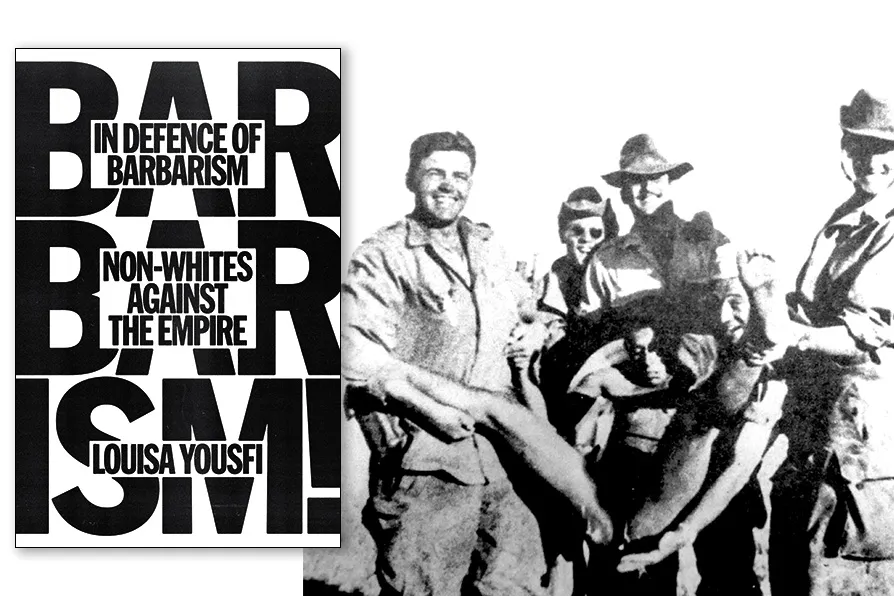JOHN GREEN, MARIA DUARTE and ANGUS REID review Fukushima: A Nuclear Nightmare, Man on the Run, If I Had Legs I’d Kick You, and Cold Storage
RON JACOBS welcomes the translation into English of an angry cry from the place they call the periphery

 DEHUMANISING: An Algerian man is stripped naked and tortured by French soldiers, the photo was taken by a French conscript and was handed over to the Algerian authorities after independence / Pic: Public domain
DEHUMANISING: An Algerian man is stripped naked and tortured by French soldiers, the photo was taken by a French conscript and was handed over to the Algerian authorities after independence / Pic: Public domain
In Defence of Barbarism: Non-whites Against the Empire
Louisa Yousfi, Verso, £8.99
RECENTLY, Verso Books published a translation of Louisa Yousfi’s Rester barbare (Fabrique, 2022), giving it the English title In Defence of Barbarism: Non-whites Against the Empire. Some would call this text a brutal, crude, even savage book. My response to that charge is simple. That is part of its intention.
In Defence of Barbarism is a compact punch to the gut of Western colonialism and its detritus. It turns the accusations and portrayals of the citizens of the global south as barbarians on its head, pointing the finger at the true barbarians; it takes the violence which is the essence of Western colonialism and imperialism for its own and demands to be heard.
It begins with the conclusion that violence is all that the coloniser, the imperialist understands. History tells us it is absolutely correct in this perception. Doesn’t every day bring news of another atrocity committed on Palestinians by the Israeli colonial project? Doesn’t the history of colonialism list its massacres and conquests as achievements worthy of praise instead of the disgust they should honestly evoke?
The book opens by acknowledging its specific inspiration. Algerian writer and revolutionary Kateb Yacine, who in 1945 participated in anti-colonial protests that saw thousands of his fellow Algerians slaughtered by French colonial troops and their settler accomplices, said in a 1967 interview: “I feel like I have so many things to say that I’m better off not being too cultivated. I have to retain a certain barbarism, I need to remain a barbarian.”
Without this element of “barbarism” one risks becoming just another human cultured in the ways of the powerful, the better off, the imperial envoy.
This book doesn’t offer solutions. It’s not a handbook for anti-imperialist organising or an analysis of the nature of violence in the context of colonial and imperial occupation and oppression. It’s an angry cry, a scream to the rest of the Earth and to the heavens above.
Yousfi writes regarding September 11 that “Heaven will avenge us.” Her father had said this in response to something on the news. He had preceded those words with the statement: “The Americans are the worst thing to have happened on Earth.” She continues, writing: “The next day, when the attacks happened, it was: ‘I told you so!’” There’s no celebration in these words, just facts and a sense that the only justice for the mass murder done in the name of American freedom is that which must come from the heavens.
Yousfi introduces her English-reading audience to a French rapper who goes by the name Booba. Among other topics, his lyrics reference colonialism, glorify money as his ticket to freedom; as the only real way left for folks like him to make it in the world they are born into. KRS-One’s query “What the f*ck am I supposed to do?” in his song “Love’s Gonna’ Get You (Material Love)” — a tale of a young man in the urban ruins who ends up slinging crack — exemplifies this sentiment born of frustration.
In Defence of Barbarism: Non-whites Against the Empire is a unique piece of work, one that raises questions and refuses succinct statements. It is designed to upset people and challenge their complacency, their coolness. If it puts the reader in the imperial zone on edge — especially the ones from the coloniser’s class and with the coloniser’s skin tone — it’s doing its job. If it makes any reader question the way they think things are, it’s doing its job. If it bores into your sensibilities and forces you to reconsider your potential future in the imperial paradigm, it’s doing its job. If it makes you get off your couch and into the streets against the genocide in Palestine, it’s doing its job.
Read it, share it, learn from it.
Ron Jacobs is the author of several books, including Daydream Sunset: Sixties Counterculture in the Seventies published by CounterPunch Books. His latest book, titled Nowhere Land: Journeys Through a Broken Nation, is now available. He lives in Vermont. He can be reached at: ronj1955@gmail.com
This is an abridged version of an article that first appeared in Counterpunch

RON JACOBS welcomes a survey of US punk in the era of Reagan, and sees the necessity for some of the same today

RON JACOBS salutes a magnificent narrative that demonstrates how the war replaced European colonialism with US imperialism and Soviet power

RON JACOBS welcomes an investigation of the murders of US leftist activists that tells the story of a solidarity movement in Chile










